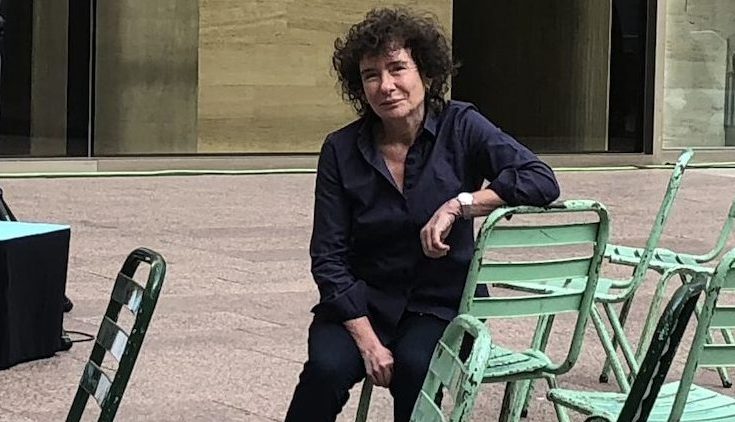
Jeanette Winterson is the Lancashire-raised author of some three-dozen books, from the 1980’s classic Oranges Are Not the Only Fruit to the timely 12 Bytes (2021). Her latest Night Side of the River (October 2023) is a book of 13 original ghost stories told with a signature autobiographical twist. Technical innovation haunts the pieces, as it does our own lives, with death considered in light of AI’s infiltration and prompting of the entire human experience. The virtual space could be a form of afterlife, the author suggests. Or ghostly presences, hitherto undetectable in our world, could be revealed by new hypersensitive technology.
Ms. Winterson presented her book in its Spanish and Catalan translations at a press conference at the CCCB in Barcelona last week. Her overall aim, she says, was to decouple ghost stories from the horror genre by introducing phantoms of different characters: “some malevolent, some lost, and some benign”. Click to listen to Jeanette Winterson talk about her book.
Thirteen ghost stories. Some traditional hauntings: places, people, difficult situations, and some about the AI world that we live in now. And in between, interventions by me in my own voice about my own supernatural experiences. I wanted to use the technology that we have at our disposal right now to explore the idea of being haunted. So there’s an app you can download which would scrape the social media program of your dead loved one, and then the app will send you texts and emails and photographs as though your dead loved one was still here. It’s a horrible idea, but it’s a great idea for a story: a woman is given this app. The question is, is it the app… or the real ghost of her dead husband who is haunting her?
Ghosts in the metaverse
The metaverse is also an interesting place where ghosts could live. Once you’re in there as an avatar you will interact with other humans who are also avatars, but also programs who are there to be your hosts or to sell you things… But how would you know if there was a ghost in there? If your partner died, you could keep his avatar alive in the metaverse. So just as technology is changing what it means to be alive, it is also changing what it means to be dead.
“More Things in Heaven and Earth…” (Hamlet, William Shakespeare)
If you want to be scared you will be. But there are also stories that are more reflective, more philosophical on the nature of death. There are two stories that sit next to each other and should be read side by side. One from the point of view of the person left behind, and the other from the point of view of the person who is now dead. Because I wanted to use the form, which is very traditional and particular, and to just push it a little bit to see what I could do to make it a little bit different. And as ever for me it’s about language, which is risky because with ghost stories we only think about content. What’s the story? What’s the twist?
“Move fast and break things” (Mark Zuckerberg, founder of Meta)
The one barrier, the hard barrier that every human being faces is death. And humans try to overcome all the barriers in their way. That’s what progress is about whether it’s technical progress or social progress, we’re always trying to get past the things that are in our way. But death, it’s in your way. And you can think of religion as the world’s first disruptive start up. Because what religion has always disrupted is this idea of death as being final. We cannot bear the idea of just coming to an end. So I wanted to explore that fear and frustration.
“Death is the great leveller” (Claudius Claudianus, 1st century Latin poet)
The Catholic Church has always liked the idea of purgatory, a process whereby your sins can be remitted as long as your relatives on Earth pay enough money. And I imagine that if we can ever upload consciousness it will not be a democratic experience. Death is democratic. But the rich don’t like that. And certainly, if we can upload consciousness, it will only be there for the very wealthy. I don’t believe it will ever be a universal human right. All we’re going to do is create another race of gods, who are not biological, who don’t die.
“I’m very skeptical of books” (Sam Bankman-Fried, cryptocurrency fraudster)
It (the tech world) is like a religion because it’s a closed hierarchy and it has a high priest caste which controls everything. It’s really narrow at the moment. They’re only interested in stuff that they can build. They’re not interested in stuff that might already exist. These guys – and they are guys – by and large they don’t read books, they don’t know anything about culture, they don’t know anything about history… And that depresses me, because they’re in charge of our future.
——

Got a real-life ghost story? Exorcise it in comments.
